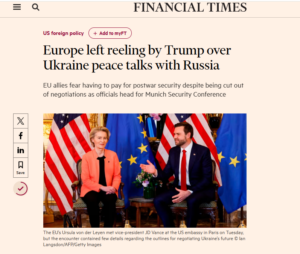The Looming Cloud of War Over Europe: An Analysis
Welcome to the Extreme Investor Network blog, where we delve deep into the economic and political landscapes shaping our world. Today, we tackle a contentious issue: the intensifying conflict in Ukraine and the motivations that might be driving it, particularly the roles of leaders like Zelensky and external influences from Europe and the United States.

As the rhetoric heats up regarding Ukraine, it’s imperative to dissect the motives behind the escalating tensions. With conflicting interests at play, many analysts believe that key players are less interested in diplomacy and more in exacerbating the conflict. Former President Trump has suggested that both Ukraine’s leader Volodymyr Zelensky and European nations may not be actively seeking peace. Instead, their ambitions could align with pushing for more aggressive military involvement, potentially dragging the United States further into conflict.
The High Costs of War
European officials are beginning to recognize the heavy financial burden entailed in prolonged warfare. As popular sentiment shifts, it is becoming clear that Ukraine’s demands for reconstruction funds are likely to fall squarely on European shoulders, with the U.S. distancing itself from footing the bill for European militarism. This revelation could reshape relationships and increase the calls for accountability among European policymakers.

The European media’s portrayal of the conflict has often stoked fears of an imminent Russian takeover, framing the narrative that Ukraine’s fall would lead to widespread chaos across Europe. This incomplete messaging neglects the historical context and the fact that the civil unrest began well before the current conflict, primarily due to Kyiv’s failure to honor the Minsk Agreements. The demonization of Russia and a skewed portrayal of events seem to be more about headlines than grounded journalism.
A Broken Democratic Process
Zelensky’s leadership raises crucial questions about democracy in Ukraine. Critics argue that his administration should have embraced a democratic process, similar to what Yugoslavia underwent during its tumultuous past, which could have potentially mitigated the ongoing crisis. The lack of elections, exacerbated by martial law, extends the stalemate and fosters disillusionment among citizens. When a leader refuses to relinquish power during a crisis, it not only stifles the people’s voice but also solidifies the leader’s grip on authority—an unsettling reflection of dictatorial governance.

Zelensky’s choice to wear military attire during public appearances, while perhaps intended to bolster a patriotic image, stands in stark contrast to historical leaders like Churchill or FDR. The symbolism feels contrived when weighed against the backdrop of his refusal to call for elections, despite claims that it is the people’s desire to defer democratic processes until the war is over. This contradiction calls into question who, exactly, he is representing.
The High-stakes Gamble of Reconstruction
In a statement that echoes the precariousness of the current geopolitical climate, Zelensky has marketed the reconstruction of Ukraine as a defining economic opportunity for Europe. Yet, as history has shown, war often leads to capitalistic ventures masked as humanitarian efforts. Concerns arise that this approach might be less about genuine recovery for the Ukrainian people and more about lining the pockets of a select few—a reality historically rooted in conflict-driven economies.

As we sustain our exploration of these complex narratives, remember that true economic recovery requires active engagement from those directly impacted. It challenges us to question the existing narratives and motivations of our global leaders. At Extreme Investor Network, we advocate for transparency and democratic governance as the keys to global stability.
Conclusion: The Path Forward
The future of Ukraine hangs in a delicate balance of international influence, local governance, and true democratic will. The road to peace and recovery lies not in the hands of those wielding power, but in the voice of the people who demand representation and democracy. As events continue to unfold, the focus must remain on promoting dialogue over warfare.
Join us at Extreme Investor Network as we continue to study the economic repercussions of these conflicts and the realities that shape our world. Stay informed, stay engaged, and strive for a future rooted in understanding rather than warfare.

